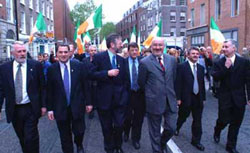 |
Irisch
Republikanische Solidarität
|
 |
BRITAIN SHUTTING DOWN STORMONT ASSEMBLY
Up to 100 civil servants are to leave the Belfast Assembly at Stormont,
which has been suspended since October. The British government has been
accused of effectively "pulling the plug" on the assembly, which
was set up
under the 1998 Good Friday Agreement.
Nationalists have demanded that the British government hold elections
to the Assembly, which were indefinitely cancelled last month.
But former Sinn Fein assembly member Conor Murphy said the decision to
transfer civil servants was a sign that the British government had no
plans to hold elections in the near future.
"People can see that they have put the elections off for the forseeable
future," he said. "If they were serious about the institutions
they
would want to keep the assembly's apparatus in place.
"Moving civil servants out of the assembly shows that they have decided
to shut Stormont down and return to direct rule."
The assembly was officially dissolved in April, ahead of the cancelled
elections on May 29.
Sinn Fein president Gerry Adams has condemned the decision and accused
British Prime Minister Tony Blair of forcing the people of the North of
Ireland to live in a 'democracy-free zone'.
DEFINING MOMENT?
Meanwhile, Monday sees the tenth showdown within the Ulster Unionist
Party over the Good Friday Agreement since it was signed.
The Ulster Unionist leader David Trimble is expected to defeat a motion
by anti-Agreement MP Jeffrey Donaldson at a meeting of the party's
ruling council, the Ulster Unionist Council (UUC). There has been
renewed speculation over a possible realignment within unionism if Mr
Donaldson, as he has hinted, quits the Ulster Unionist Party following
another defeat.
Manoeuvrings before the UUC meeting have seen both David Trimble and Mr
Jeffrey Donaldson face no confidence votes in their respective
constituency associations.
Mr Donaldson has written to all 860 UUC delegates, setting out why
he believes his motion calling for a rejection of the Hillsborough
Joint Declaration should be adopted on Monday.
The Joint Declaration, published by the two governments last month
after multi-party negotiations, includes plans for a scaling down of
the British military presence in Ireland, a provision to normalise the
status of republicans 'On the Run' from war-related prosecutions, and
a
controversial sanctions body which could exclude Sinn Fein from
government in certain circumstances.
These moves are conditional on a substantial IRA 'act of completion' to
cease alleged hostile activities and to put arms beyond use.
Donaldson's letter deals in detail with why he opposes the Declaration.
"The Declaration should be set aside and we should go back to the
negotiating table to address all of these issues," he says.
He called for the formation of a unionist coalition, including Ian
Paisley's Democratic Unionist Party, to attempt the renegotiation of
the Good Friday Agreement.
Trimble ally Reg Empey He blamed the infighting on the
Donaldson UUC challenge, but said he did not want another split, or Mr
Donaldson to leave the party. He added that the repeated calling of
UUC meetings was undermining the party, and claimed this latest meeting
was taking pressure off republicans.
Mr Donaldson said it was a "defining moment for unionism". He
has
dismissed a compromise amendment from Mr Trimble which while, refusing
to endorse the Joint Declaration, does not reject it outright.
In a six-point amendment, Mr Trimble condemned plans for an "amnesty"
for OTRs and called for the retention of the battalions of the British
Army's Royal Irish Regiment based in Ireland.
The amendment makes clear that the UUP does not endorse the Joint
Declaration and that no consideration would be given to a return to
power-sharing with nationalists unless approved by the UUC.
But Mr Donaldson's dismissal of his leader's resolution has upped the
ante and makes a possible compromise between the two UUP camps
unlikely.
In an attack on the leadership, Mr Donaldson said: "The days of
constructive ambiguity are at an end. We cannot fudge this issue of the
Joint Declaration.
"Foolishly believing we can cherry-pick the document flies in the
face
of reality."
He claimed that an Irish Government representative on the proposed
sanctions body was evidence of an intolerable "interference".
Mr Donaldson repeated that he would consider his position if his motion
was defeated tomorrow night, saying: "I will look at all the options
and will consult with my constituency association and then decisions
will have to be made."
Letzte Änderung:
06-Sept-03